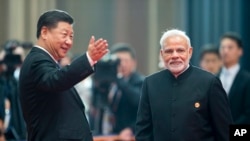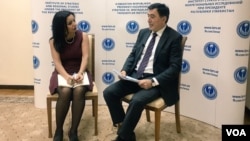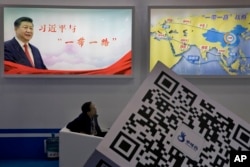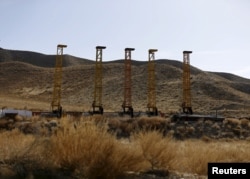Based in Beijing, the Shanghai Cooperation Organization (SCO) encompasses eight countries representing 3 billion people. That gives it heft but worries many in the West, who see an emerging bloc that will oppose Washington and its allies in Eurasia.
The group's new secretary-general, former Uzbek Foreign Minister Vladimir Norov, says the SCO aims to be a connector, not a divider.
"We are not an anti-Western bloc," said Norov, "or a military alliance as many Western experts claim."
U.S. relations
The organization holds regular political and economic summits, as well as large-scale security and counterterrorism drills. In a recent interview with VOA in Tashkent, Uzbekistan, Norov said the group was broadening its focus but that that should not be seen as threatening.
Founded in 1996 as the "Shanghai Five" by China and three Central Asian states and Russia, which shared borders with China, the group added Uzbekistan, renamed itself the SCO in 2001, and expanded to include India and Pakistan in 2018. Its power players are Russia and China, and the group has often been seen as a platform for their coordination, especially on security issues that needle Washington. In 2005, the group called for a timeline to end the coalition military presence in Afghanistan, a step that deeply troubled many in the George W. Bush administration.
Many Western security analysts view the SCO as a strategic platform for China and Russia to showcase their individual and combined power and leadership, while smaller countries in Central Asia use it to amplify their voices and assert their positions on global issues.
Others, however, view the group as too diverse to inculcate a shared vision. They dismiss its prospects, noting, for example, that India and Pakistan are members but at loggerheads on so many security issues that it is hard to imagine them coordinating within the group. The SCO suffers from a lack of funding, cohesion and mutual trust, these observers say.
Norov argues otherwise. The group, he said, has played an important role in maintaining stability — for instance, by enabling greater coordination among member states as they fight terrorism, narcotics trafficking and organized crime.
The SCO has a regional anti-terror unit in Tashkent. And Norov said intelligence cooperation was a strength, even though many view that coordination as a means for those members with poor human rights records to share one another's repression and escape Western scrutiny.
Boosting economic ties
Yet even as he boosts the SCO, Norov agrees the group has not reached its potential, particularly as a platform for economic cooperation.
"We are a multilateral organization but not so active economically," Norov said. "And that is why there will be focus on implementing projects to develop transportation-related communication systems."
Indeed, economic connectivity has become a major focus within the SCO. China promotes connectivity through its Belt and Road infrastructure initiative. India, which opposes the Belt and Road, has its own efforts, aiming to link itself to Central Asia via Iran's Chabahar Port. Kazakhstan and others aim to reap the benefits of transit, sitting astride new transportation corridors.
Energy cooperation, which calls for connectivity in the form of pipelines and connections among national power grids, has been growing, especially as Russia shows serious interest in pushing its hydrocarbons to the Chinese market.
Norov, the first Uzbek to head the group, knows the West well — and its apprehensions about the SCO — from his time as foreign minister and as Uzbekistan's top diplomat at the European Union.
As an Uzbek diplomat, Norov will likely reflect Tashkent's hope for "more harmony" in the group. But Uzbekistan, too, aims to latch onto the emerging connectivity effort: It wants a railroad to connect with China. And as one of the world's only double-landlocked countries, it is eager to gain access to seaports through SCO members China, India and Pakistan.
Afghan stabilization
Norov noted that the SCO does have a security agenda. But this, he argued, meshes with that of the West — namely, to stabilize Afghanistan, which has observer status in the SCO. All members have committed to assist the war-torn country and support its peace effort through the SCO's Afghanistan Contact Group.
Norov stressed the objective of helping with social and economic development while "promoting a political-diplomatic solution to the Afghan problem." China, the biggest SCO donor, has invested billions to develop natural resources in Afghanistan.
Norov especially emphasized the "softer" side of the SCO's evolving agenda. He noted that the SCO hoped for new partnerships in tourism and education. His native Uzbekistan, for example, will house a Silk Road University, whose mission is to produce graduates skilled in business and tourism.
Norov faces many challenges — fostering organizational coherence, contributing on Afghanistan, broadening the SCO's reach into hard and soft connectivity. But another challenge will be to assuage the concerns of the group's many critics.







